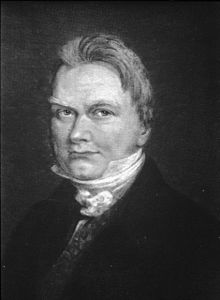
J. J. Berzelius
Jöns Jacob Berzelius (20 August 1779 – 7 August 1848) was a Swedish chemist. He worked out the modern technique of chemical formula notation, and is together with John Dalton, Antoine Lavoisier, and Robert Boyle considered a father of modern chemistry.
He began his career as a physician but his researches in physical chemistry were of lasting significance in the development of the subject. He achieved much in later life as secretary of the Swedish Academy. He is known in Sweden as the Father of Swedish Chemistry.
Berzelius was born at Väversunda in Östergötland in Sweden. He lost both his parents at an early age. He was taken care of by relatives in Linköping where he attended the school today known as Katedralskolan. Thereafter he enrolled at the Uppsala University where he learned the profession of medical doctor from 1796 to 1801. He was taught chemistry by Anders Gustaf Ekeberg, the discoverer of tantalum. He worked as an apprentice in a pharmacy and with a physician in the Medevi mineral springs.
During this time he conducted analysis of the spring water. For his medical studies he examined the influence of galvanic current on several diseases and graduated as M.D. in 1802. He worked as physician near Stockholm until the mine owner Wilhelm Hisinger discovered his analytical abilities and provided him with a laboratory.Between 1808 and 1836, Berzelius worked together with Anna Sundström, who acted as his assistant
Not long after arriving to Stockholm he wrote a chemistry textbook for his medical students, from which point a long and fruitful career in chemistry began. In 1828 he compiled a table of relative atomic weights, where oxygen was set to 100, and which included all of the elements known at the time.
This work provided evidence in favour of the atomic theory proposed by John Dalton: that inorganic chemical compounds are composed of atoms combined in whole number amounts. In discovering that atomic weights are not integer multiples of the weight of hydrogen, Berzelius also disproved Prout's hypothesis that elements are built up from atoms of hydrogen.
In order to aid his experiments, he developed a system of chemical notation in which the elements were given simple written labels—such as O for oxygen, or Fe for iron—with proportions noted by numbers. This is the same basic system used today, the only difference being that instead of the subscript number used today (e.g., H2O), Berzelius used a superscript (H2O).
Berzelius had an effect on biology as well. He was the first person to make the distinction between organic compounds (those containing carbon), and inorganic compounds. In particular, he advised Gerardus Johannes Mulder in his elemental analyses of organic compounds such as coffee, tea, and various proteins. The term "protein" itself was coined by Berzelius, after Mulder observed that all proteins seemed to have the same empirical formula and came to the erroneous conclusion that they might be composed of a single type of (very large) molecule.
No comments:
Post a Comment